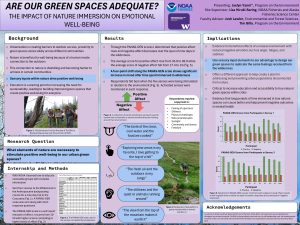Are our Green Spaces Adequate? The Impact of Nature Immersion on Emotional Well-Being
Urban city populations around the world are growing while rates of depression and anxiety rise along with them. The purpose of this study was to build upon previous work done to determine if nature can cause positive well-being. Time spent immersed in naturalistic areas can create better emotional well-being outcomes for urbanites. I aim to increase access to green spaces for urban communities by understanding the complexity and importance of their impact (ie. systems thinking). To accomplish this, I used my internship with NOAA Fisheries and the Alaska Fisheries Science Center (AFSC) to gain experience on how to educate others on complex topics while assisting with NOAA Science Camp. I sent a series of four Positive And Negative Affect Scale (PANAS) surveys with 11 urbanite participants into the Cascades to see how nine days in the wilderness changed their emotional well-being positively or negatively over time, including journal responses after their return from the wilderness. Findings show that more time spent in nature can cause positive mental well-being outcomes, like feelings of peacefulness, fulfillment and a decrease in negative emotional outcomes. This means that communities living near vacant or underutilized spaces (ie. greyfields) who feel negative emotional outcomes are less likely to be able to use the Earth’s natural paths to overcome them. A lack of education and long-term access to green spaces creates a missed opportunity, especially to those living in urban areas. Adequate green spaces are a key to reducing negative mental well-being with the right application.
